
Anxiety is a very common emotion experienced by most of us in response to being confronted with an unpleasant and potentially harmful trigger, typically characterized by feelings of fear, anger, sadness, and panic. Anxiety is in fact, a protective mechanism designed to prevent ourselves from engaging in potentially harmful behaviours and to cope with a stressful and tense situation. But when anxiety becomes an excessive and irrational dread of everyday situations with feelings of worry and tension without much provocation, it becomes a disabling disorder and needs medical attention. Anxiety attacks usually come without any prior warning, and although the fear is generally exaggerated and without reason, the perceived danger is very real.
Common physical symptoms of anxiety include sweaty palms, dizziness, and diarrhoea or intestinal/digestive discomfort, a feeling of general fatigue, insomnia, and restlessness. One may also experience a speeding heartbeat, tightness in the chest, rapid breathing, or tingling in the hands and feet.
Causes
Anxiety is caused due to certain physical malfunction in brain chemistry, where the brain sends and receives false emergency signals. Adrenalin and noradrenalin are then released, causing the same physiological changes in the body as would be experienced in a true ‘danger’ situation, e.g. being chased by the tiger scenario. Some of the anxiety you experience may actually be due to particular stimulants you are consuming (excess of caffeine, nicotine or colas) or imbalances in particular vitamins and minerals. Consumptions of refined sugars and starches (leading to blood glucose level fluctuations), diets deficient in protein or fat, and hyperactive thyroid or adrenal glands may also contribute to the occurrence of anxiety feelings.
Nutritional Intervention
Certain nutritional factors are known to have a sedative action upon the nervous system and their deficiency may eventually result in anxiety. Conversely, an excess of certain minerals, which speed up the nervous system can also produce anxiety feelings. Although food can not correct anxiety, considering certain dietary modifications has been shown to reduce the occurrence and alleviate the symptoms.
- Increasing intake of complex carbohydrates is thought to increase the amount of serotonin in your brain, which has a calming effect. Complex carbs, such as whole grains and whole pulses, starchy vegetables like potato, Yam, Brown Rice take longer to digest than sugary simple carbs like fruits, sweet sherbets and glucose based drinks. So you stay fuller longer and your blood sugar is likely to stay steady, eliminating stress and anxiety. Excess intake of sugar can worsen the anxiety, irritability, and nervous tension.
- Eat frequent small meals during the day as keeping long gaps between meals or skipping meals can result in low blood sugar, which can cause anxiety.
- Calcium, magnesium, zinc, inositol, choline, and the amino acids tryptophan and taurine are among the “sedative” nutrients, hence maintaining an adequate intake of these nutrients through milk, green leafy vegetables, eggs, sesame seeds, nuts, whole grains and soybean may prevent anxiety.
- Limit or avoid alcohol. The immediate effect of alcohol may be calming for most people. But as alcohol is metabolized by your body, it can cause anxiety-like symptoms.
- Excess of coffee, tea, cigarettes, coke stimulate an adrenal response in your body provoking anxiety and also depleting the body of necessary vitamins and minerals that help balance our mood and nervous system. Instead, try chamomile tea to soothe your senses.
- Taking B complex supplements are helpful in bringing relaxation or energy to individuals who are stressed or fatigued.
- Herbs like St. Johns wort help to boost serotonin levels (the `feel good’ neurotransmitter) which discourages anxiety and enhances mental ability.
- Be physically active. Besides keeping your weight at bay, regular exercise releases endorphins that put you at ease and give you an all-around sense of well being.
- Include essential fatty acids in your diet through nuts, fish and fish oil supplements as they have been shown to greatly affect mood.
- Relieve your anxiety or stress by laughing, meditating, yoga and any activity, which relaxes you. This increases the endorphin levels to your brain and decreases the number of stress hormones circulating.
- Besides this surround yourself with positive people, positive thoughts, a positive activity which keeps you in a balanced state of mind.
With proper care which includes exercise, healthy diet, and proper nutritional supplementation you will be able to ease symptoms, learn coping mechanisms and feel good. For a personalised Homeopathy plan to manage anxiety, call toll-free ![]() 1-800-843-0206 and book your appointment with Health Total homeopathy experts.
1-800-843-0206 and book your appointment with Health Total homeopathy experts.
